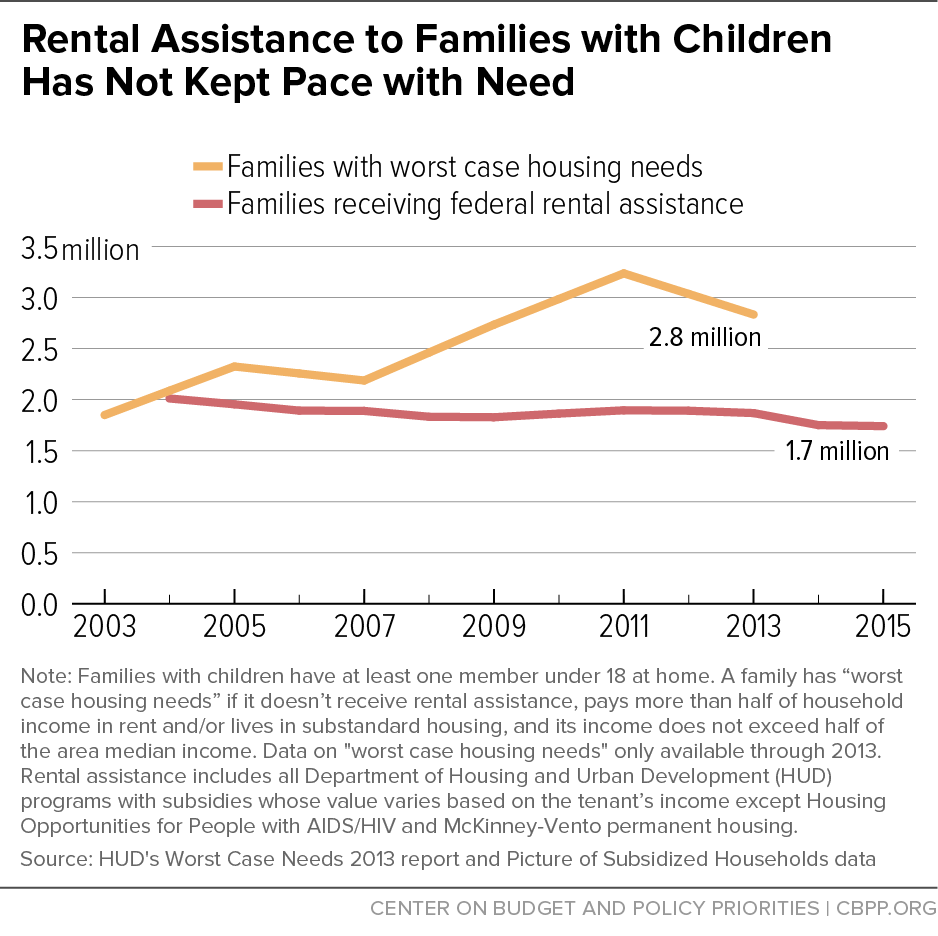
Head Smacker: Rental Assistance to Families with Children Falls as Need Rises
Earlier this week, a blog entry from my colleague Melissa Roark discussed a new report showing that affordable housing is out of reach for millions of renters across the US. And higher rents, especially when combined with flat wages and an economic recovery that hasn’t reached low-income families, means an increased need for rental assistance. Unfortunately, however, a new report from the Center on Budget and Policy Priorities shows that the number of families with children receiving federal rent subsidies has fallen by over 250,000 since 2004 and is at its lowest point in more than a decade, despite rising need.
According to CBPP, the number of families with “worst case housing needs,” meaning they paid more than half their income for rent or lived in severely substandard housing, rose by 53 percent between 2003 and 2013, to nearly 3 million. These families typically have two children and are headed by a single woman or couple working for low wages.
Last month, the Washington Post reported that the number of homeless families in the District of Columbia increased by more than 30 percent over a year ago, and that for the first time since the annual homeless count began in 2001, homeless children and their parents in DC outnumbered homeless single adults. And the Center on Budget noted similarly alarming statistics nationwide. In fact, homelessness among school-age children is at a record high. It’s been well-documented that children who experience homelessness and housing instability are more likely to develop physical, mental and behavioral problems and are less likely to do well in school – problems that follow them into adulthood.
The good news is that the House and Senate both passed FY17 appropriations bills that include enough funding to renew existing housing choice vouchers. The bad news is that neither of these bills includes the $88 million requested by President Obama to fund 10,000 new vouchers for homeless families. And we know homeless families need other supports as well, but the House budget proposal gets 62 percent of its cuts from programs for low- and moderate-income programs, and the additional package of budget cuts proposed by the GOP to attract more right-wing members gets a whopping 87 percent of its cuts from these programs.
Investments in housing and other services for low-income adults and families are critical. Millions of American children and adults rely on federal anti-poverty programs in times of need. That’s why the Coalition on Human Needs will be cosponsoring an in-person and live-streamed event on June 16, 1-3pm ET, highlighting the good these programs do, how certain proposals would lessen their effectiveness and ways they can be improved upon.
The event will follow the soon-to-be-released report from a House GOP task force on poverty that’s expected to be released on Tuesday, June 7. As we previously noted, human needs advocates fear the task force’s recommendations, if implemented, would actually exacerbate poverty in our country. We’ll show that there is a better path.
Click below to join us on Thursday, June 16 for our special event: What Works – and What Doesn’t – to Reduce Poverty and Expand Opportunity.



The views and opinions expressed in this post are those of the author(s) and do not necessarily reflect those of MomsRising.org.
MomsRising.org strongly encourages our readers to post comments in response to blog posts. We value diversity of opinions and perspectives. Our goals for this space are to be educational, thought-provoking, and respectful. So we actively moderate comments and we reserve the right to edit or remove comments that undermine these goals. Thanks!